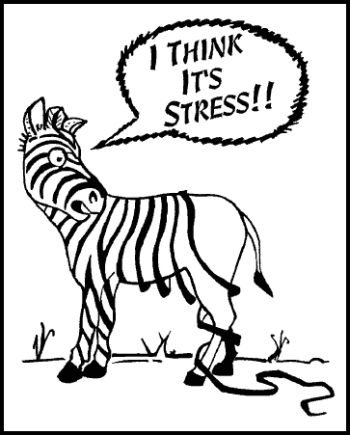Go Slow to Go Fast
- Jean Culver
- Aug 12, 2019
- 3 min read
Updated: Dec 9, 2019
"Go slow to go fast! We live as though there aren't enough hours in the day but if we do each thing calmly and carefully we will get it done quicker and with much less stress." - Viggo Mortensen

I'm a Little Stressed
Fight or Flight
Does excess or continued stress really affect your body? Absolutely. When you're under stress you go into

the 'fight or flight' response mode. When this happens a tiny region at the base of your brain, your hypothalamus, sets off an alarm system in your body. This system prompts your adrenal glands to release a surge of hormones, including adrenaline and cortisol.
Cortisol, also known as the 'stress hormone', increases sugars in the bloodstream, and adrenaline increases your heart rate, elevates your blood pressure and boosts energy supplies.
The release of cortisol also alters immune system responses and suppresses the digestive system, the reproductive system and growth processes.
Constantly Under Attack
When the stress or 'perceived-threat' is over, your heart rate, blood pressure, sugar levels and other systems resume their normal activities because your hormone levels have returned to normal.
If, however your stresses are always present and you constantly feel under attack, the 'fight or flight' reaction stays turned on. When this happens the overexposure to these stress hormones can disrupt almost all of your body's processes.
This puts your body at risk for many health problems, including: Anxiety, depression, digestive problems, headaches, heart disease, sleep problems, weight gain, and even memory and concentration issues.
Stress and Eating
Continued stress and the 'fight or flight' reaction many times causes 'stress eating' or emotional eating. Usually this is not even a conscious decision, but rather a mindless response to a vague, negative emotion, in the hope that food will make us feel better.
Stress eating usually comes on suddenly. Wham, you are craving nachos or chocolate fudge cake or a platter of french fries. Stress eating causes a craving for a food that's sugary, fatty and high in calories; whereas with physical hunger food in general sounds good to you, which allows your body to consider healthy food choices to satisfy the hunger.
When physical hunger is satisfied you tend to stop eating. When stress eating is the driver, it's to easy to ignore what your stomach is telling you and eat way to much in an attempt to feel better.
Stress eating might make you feel better for the moment, but pretty soon guilt and shame move in which in turn causes more stress.
A Fact of Life
Stressful events are simply a fact of life and some stressful situations you may not be able to change. But you can learn to identify what stresses you and how to take care of yourself physically and emotionally when faced with stressful situations.
Stress Antidotes
Eating a healthy diet, getting regular exercise and plenty of sleep are crucial to managing stress.
Practicing relaxation techniques like yoga, deep breathing, learning to meditate and even getting a massage can help manage stress.
Take time for yourself; things like hobbies, listening to music, taking a walk, reading a good book.
Simply put; love yourself and know you deserve your own special time.
Enjoy healthy, happy friendships.
Have a sense of humor. Learn to laugh at yourself.
Volunteer in your community or look to do something on a daily basis to make someone else smile.










Comments